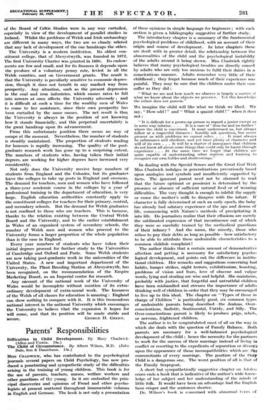Wales
THE University of Wales is at the same time a national university and a British university, steadily increasing in prestige. Like other British universities, it is a product of British and European culture ; but, unlike them, it stands in a definite relation to a separate but persistent culture. Further, the University of Wales is a federal university, carrying on, in spite of very great geographical difficulties, the experiment which failed in the case of the Victoria University. The geographical difficulties are such that it is easier to travel from any one of the four colleges to London than to another college, with the exception of Cardiff and Swansea. The real capital for University purposes is the capital of Wallin irredenta—Yr Amwylhig—which the English call Shrewsbury.
The University of Wales is thus in a unique position, faced with many and peculiar difficulties. It must pay attention to the Celtic culture and the advancement of Celtic studies, and yet must not do so at the expense of its devotion to the work which, falls to it in its character of a British university. Now Celtic studies are not studies of the kind that rich men normally endow, or that the State singles out for special favour ; and the student who specializes in this direction handicaps himself greatly, as far as worldly success is his aim. The Civil Service Commissioners do not, at present, permit candidates to submit Welsh as a language on the same footing as English. And again, since Celtic cultures and interest in them persist only in small communities of little wealth, the Celtic student cannot ordinarily undertake researches unless he has independent means or is financed. Either condition is rarely fulfilled. The University of Wales has set up a Board of Celtic Studies, provided for in the University Charter, but the present depression in industry has made it necessary to reduce the university grant to this body. It would be a matter for great regret if the work of the Board of Celtic Studies were in. any way curtailed, especially in view of the development of parallel studies in Ireland. Whilst the problems of Welsh and Irish archaeology are different in many ways, the two are so closely related that any lack of development of the one handicaps the other.
The University is a modern institution. Its oldest con- stituent college, that of Aberystwyth, was founded in 1872, The first University Charter was granted in 1890. Its endow- ments are few and small, and for its finances it depends upon the produce of a voluntary penny rate, levied in all the Welsh counties, and on Government grants. The result is that the University is peculiarly sensitive to economic depres- sion, though it does not benefit in any marked way from prosperity. Any situation, such as the present depression in the coal and iron industries, which causes rates to fall into arrears at once affects the University adversely ; and it is difficult at such a time for the wealthy men of Wales to come to her assistance, since their own prosperity has been curtailed by the same causes. The net result is that the University is always in the position of not knowing how it stands financially, and this perpetual uncertainty is the great handicap upon its advancement.
From this unfortunate position there seems no way of escape at the moment. Nevertheless, the number of students is steadily maintained. The proportion of students reading for honours is rapidly increasing. The quality of the post- graduate research work has gone up to a surprising extent. The numbers of students who, having taken their initial degrees, are working for higher degrees have increased very considerably.
Not only does the University receive large numbers of students from England and the Colonies, but its graduates leave the colleges to take up posts in England and overseas. The demand for teachers, men and women who have followed a three-year academic course in the colleges by a year of professional training in the department of education, is very large. English education authorities constantly apply to the constituent colleges for teachers for their primary, central, and secondary schools. But the demand for Welsh graduates is not confined to those who are teachers. This is because, thanks to the relation existing between the Central Welsh Board and the University, and to the earlier establishment in Wales of an organized system of secondary schools, the number of Welsh men and women who proceed to the University forms a larger proportion of the whole population than is the case in England.
Every year numbers of students who have taken their initial degrees proceed for further study to the Universities of Cambridge and Oxford and Paris. Some Welsh students are now taking post-graduate work in the universities of the United States. A new and important department of the University, the Plant Breeding Station at Aberystwyth, has been recognized, on the recommendation of the Empire Marketing Board, as an Imperial centre for research.
Any account of the national work of the University of Wales would be incomplete without mention of its extra- ordinary development of extra-mural work. The keenness of the Welsh of all classes for education is amazing : England can show nothing to compare with it. It is this tremendous national interest in the national University which encourages the University to believe that the expansion it- hopes for will come, and that its position-will be made stable and



















































 Previous page
Previous page